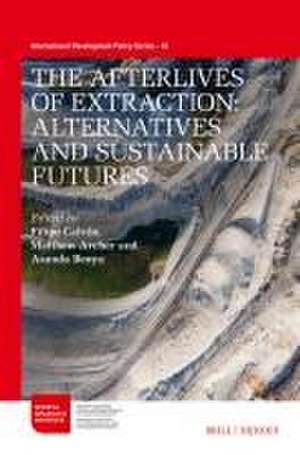The Afterlives of Extraction: Alternatives and Sustainable Futures: International Development Policy, cartea 16
Filipe Calvão, Matthew Archer, Asanda Benyaen Limba Engleză Paperback – noi 2023
This volume accompanies IDP 15, The Lives of Extraction: Identities, Communities, and the Politics of Place.
Preț: 419.75 lei
Preț vechi: 493.83 lei
-15% Nou
Puncte Express: 630
Preț estimativ în valută:
80.32€ • 84.07$ • 66.85£
80.32€ • 84.07$ • 66.85£
Carte indisponibilă temporar
Doresc să fiu notificat când acest titlu va fi disponibil:
Se trimite...
Preluare comenzi: 021 569.72.76
Specificații
ISBN-13: 9789004538856
ISBN-10: 9004538852
Dimensiuni: 155 x 235 mm
Greutate: 0 kg
Editura: Brill
Colecția Brill | Nijhoff
Seria International Development Policy
ISBN-10: 9004538852
Dimensiuni: 155 x 235 mm
Greutate: 0 kg
Editura: Brill
Colecția Brill | Nijhoff
Seria International Development Policy
Notă biografică
Filipe Calvão is an economic and environmental anthropologist. He is an associate professor at the Geneva Graduate Institute. His research examines the politics, ecologies and economies of mineral extraction, with a current focus on the nexus between digitalization, work and extractivism.
Matthew Archer studies corporate sustainability, sustainable finance and sustainable development through the lens of political ecology and environmental anthropology. He is currently a lecturer in sustainability in the Department of Environment and Geography at the University of York.
Asanda Benya is a labour sociologist based at the University of Cape Town. She works at the intersection of gender, class and race. She researches the extractives industries, gendered workplace subjectivities, and labour and feminist movements.
Matthew Archer studies corporate sustainability, sustainable finance and sustainable development through the lens of political ecology and environmental anthropology. He is currently a lecturer in sustainability in the Department of Environment and Geography at the University of York.
Asanda Benya is a labour sociologist based at the University of Cape Town. She works at the intersection of gender, class and race. She researches the extractives industries, gendered workplace subjectivities, and labour and feminist movements.
Cuprins
Preface
List of Figures and Tables
Abbreviations
Notes on Contributors
1 Introduction: Global Afterlives of Extraction
Filipe Calvão, Asanda Benya and Matthew Archer
Part 1
Post-extractivism: Debates and Practices
2 Expanding Extractivisms: Extractivisms as Modes of Extraction Sustaining Imperial Modes of Living
Erik Post
3 The Structures of Conquest: Debating Extractivism(s), Infrastructures and Environmental Justice for Advancing Post-development Pathways
Alexander Dunlap
4 Logics of Extraction and of the Valorisation of Culture: the Role of Post-extraction Investment in the Creation of Inequality in China
Ryan Parsons
5 Regulating Mine Rehabilitation and Closure on Indigenous Held Lands: Insights from the Regulated Resource States of Australia and Canada
Emille Boulot and Ben Collins
Part 2
Resilience, Contestation and Resistance
6 Aluminium in Suriname (1898–2020): an Industry Came and Went, But Its Impacts on the Maroon Communities Remain
Simon Lobach
7 Contesting Extraction: Challenges for Coalition Building between Agrarian and Anti-mining Movements
Louisa Prause
8 ‘We Are Nature Defending Itself’: the Forest of Dannenrod Occupation as an Example of Contested Extractivism in the Global North
Dorothea Hamilton and Sina Trölenberg
9 National Resources, Resistance, and the Afterlives of the New International Economic Order in Bangladesh
Paul Robert Gilbert
Part 3
‘Green’ Extractivism and Its Discontents
10 The ‘Alterlives’ of Green Extractivism: Lithium Mining and Exhausted Ecologies in the Atacama Desert
James J. A. Blair, Ramón M. Balcázar, Javiera Barandiarán and Amanda Maxwell
11 Green Masquerade: Neo-liberalism, Extractive Renewable Energy Transitions, and the ‘Good’ Anthropocene in South Africa
Michelle Pressend
12 Electric Vehicle Paradise? Exploring the Value Chains of Green Extractivism
Devyn Remme, Siddharth Sareen, Håvard Haarstad and Kjetil Rommetveit
Index
List of Figures and Tables
Abbreviations
Notes on Contributors
1 Introduction: Global Afterlives of Extraction
Filipe Calvão, Asanda Benya and Matthew Archer
Part 1
Post-extractivism: Debates and Practices
2 Expanding Extractivisms: Extractivisms as Modes of Extraction Sustaining Imperial Modes of Living
Erik Post
3 The Structures of Conquest: Debating Extractivism(s), Infrastructures and Environmental Justice for Advancing Post-development Pathways
Alexander Dunlap
4 Logics of Extraction and of the Valorisation of Culture: the Role of Post-extraction Investment in the Creation of Inequality in China
Ryan Parsons
5 Regulating Mine Rehabilitation and Closure on Indigenous Held Lands: Insights from the Regulated Resource States of Australia and Canada
Emille Boulot and Ben Collins
Part 2
Resilience, Contestation and Resistance
6 Aluminium in Suriname (1898–2020): an Industry Came and Went, But Its Impacts on the Maroon Communities Remain
Simon Lobach
7 Contesting Extraction: Challenges for Coalition Building between Agrarian and Anti-mining Movements
Louisa Prause
8 ‘We Are Nature Defending Itself’: the Forest of Dannenrod Occupation as an Example of Contested Extractivism in the Global North
Dorothea Hamilton and Sina Trölenberg
9 National Resources, Resistance, and the Afterlives of the New International Economic Order in Bangladesh
Paul Robert Gilbert
Part 3
‘Green’ Extractivism and Its Discontents
10 The ‘Alterlives’ of Green Extractivism: Lithium Mining and Exhausted Ecologies in the Atacama Desert
James J. A. Blair, Ramón M. Balcázar, Javiera Barandiarán and Amanda Maxwell
11 Green Masquerade: Neo-liberalism, Extractive Renewable Energy Transitions, and the ‘Good’ Anthropocene in South Africa
Michelle Pressend
12 Electric Vehicle Paradise? Exploring the Value Chains of Green Extractivism
Devyn Remme, Siddharth Sareen, Håvard Haarstad and Kjetil Rommetveit
Index











